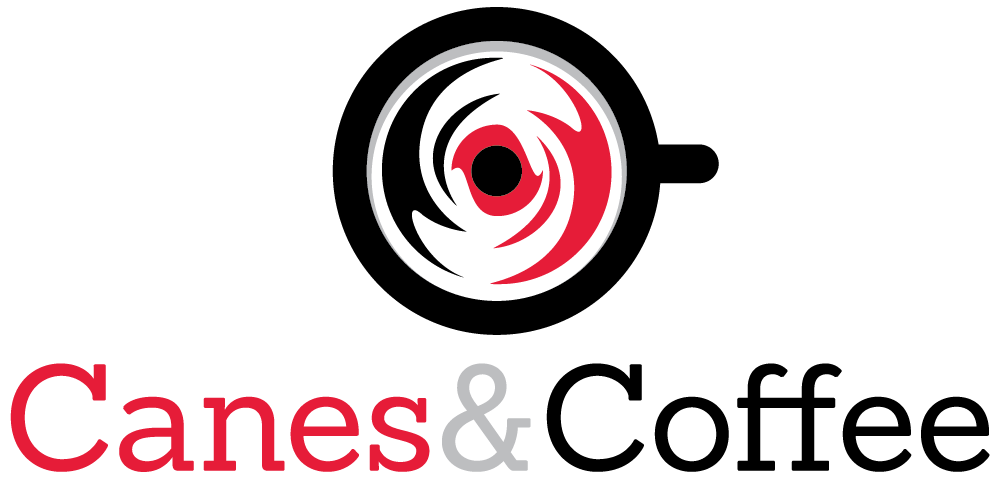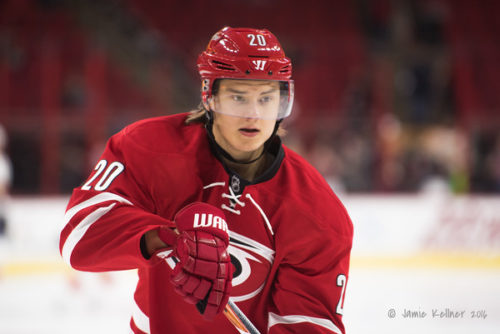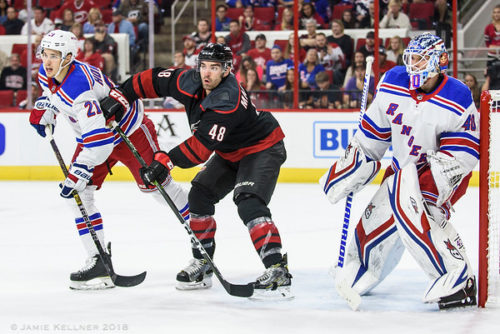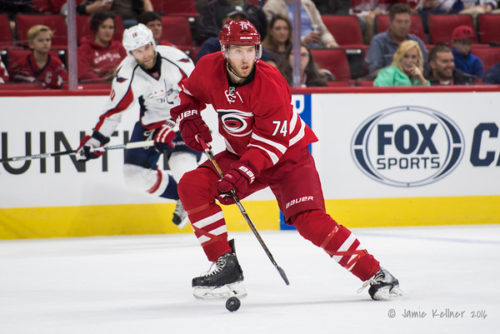To bide time until training camp, Canes and Coffee has been very fortunate to offer a ‘back to school’ series featuring great short interviews on the three 2016 Carolina Hurricanes draftees who are just starting college and preparing to play NCAA hockey for the 2016-17 season.
Today’s entry features goalie Jack LaFontaine whom the Carolina Hurricanes selected in the third round of the 2016 NHL draft.
You can find a great menu of articles on LaFontaine from prior to the NHL draft HERE.
LaFontaine was also included in the notes from the Hurricanes prospect camp in July.
Comments from Jack LaFontaine’s NAHL Coach Joe Dibble
Joe Dibble is the head coach and general manager of the Janesville Jets. In 2016-17, he will be entering his fifth season as the Janesville Jets coach in 2016-17. In his 4 years with the Jets, Dibble has seen 46 of his players advance to play Division I NCAA hockey. Joe’s full bio can be found on the Janesville Jets web site.
Canes and Coffee: How would you describe Jack LaFontaine’s game in 2-3 sentences. What are his strengths?
Janesville Jets Coach Joe Dibble: Jack has an unbelievable work ethic and he’s very athletic. He never gives up on pucks, and makes a lot of saves he probably isn’t supposed to make.
Canes and Coffee: What areas do you see for improvement as he develops as a player over the next 2-3 years?
Janesville Jets Coach Joe Dibble: I think he’s going to have to focus a bit on controlling his emotions during a game. He could also challenge a bit more and get off the goal line quicker in coming out of his crease.
Canes and Coffee: To which NHL player(s) would you compare his game and style of play?
Janesville Jets Coach Joe Dibble: I’m not the game’s best goalie guy, but if you look at big, athletic goalies who are quick side-to-side, you first start to think of guys like Jonathan Quick, who’s explosive coming off of the pipe.
Canes and Coffee: Do you have any other thoughts/comments on Jack LaFontaine that are not covered by the questions above?
Janesville Jets Coach Joe Dibble: Jack is a player who’s going to have just as big an impact off the ice as on. In his community, wherever he’ll be, he’s gonna give that town, that city, just as much as he gives his teammates and coaches within the organization. He consistently brings the right attitude and the right mindset every day to improve a team’s winning culture. That’s just who he is as a human being.
Comments on Jack LaFontaine’s situation at the University of Michigan from Steve Kornacki at MGoBlue.com
Steve Kornacki works for the University of Michigan athletic department covering Michigan Wolverines athletics including the men’s hockey team at MGoBlue.com. Steven’s previous hockey experience includes covering the Detroit Red Wings for the Detroit Free Press and working as the NHL/Tampa Bay Lightning editor at the Tampa Tribune for three seasons.
Canes and Coffee: How did Michigan hockey finish up the 2015-16 season? What is the early outlook for the 2016-17 season in terms of roster changes and season expectations?
Steve Kornacki from MGoBlue.com: Michigan was one win away from reaching the Frozen Four, and also won the Big Ten Tournament last season. It was a season when the Wolverines reestablished themselves as an elite college team. The entire, high-scoring CCM Line — Kyle Connor, J.T. Compher and Tyler Motte — signed with NHL teams and will be missed. Goalie Steve Racine closed out his career with a flourish, blossoming as a senior. However, Coach Red Berenson thinks his defense will be better, and the low-scoring games he believes winning teams pull out could be a better fit for his new lineup, which also includes some strong incoming defensemen.
Canes and Coffee: What is the situation in net for the 2016-17 season? What is an early best guess for LaFontaine’s role and volume of starts?
Steve Kornacki from MGoBlue.com:My guess, before pre-season camp begins, is that LaFontaine will split the job early with either senior Zach Nagelvoort or another good incoming freshman, Hayden Lavigne. Berenson will rotate two goalies unless one of them really jumps out, and pick a No. 1 from their game showings.
Canes and Coffee: What are you hearing about Jack LaFontaine and his ability pre-arrival in Ann Arbor?
Steve Kornacki from MGoBlue.com:I’m hearing that LaFontaine is the best freshman goalie Michigan has brought in in quite some time. The coaching staff really likes not only his athleticism but his smarts and mature approach to development. He will get some great coaching from Steve Shields, a former NHL goalie who volunteers on a basically full-time basis.
Canes and Coffee: Do you have any other insight or information on Jack LaFontaine that might be of interest to Carolina Hurricanes fans?
Steve Kornacki from MGoBlue.com:Michigan fans, who are rabid and know their hockey, are excited about LaFontaine because he was a third-round pick by the Hurricanes with visible strong skills. The Wolverines have been searching for a standout goalie and LaFontaine will get his chance to be that.
A huge thank you to Janesville Jets Coach Joe Dibble and MGoBlue.com’s Steve Kornacki for providing this perspective on Carolina Hurricanes prospect Jack LaFontaine.
Go Canes!




Love these articles Matt. Nice to read an ex-coach’s perspective and be able to follow the development of these kids going to college programs.
Good info on Jack and the other college draftees.
Do you feel that they usually complete four years
in college before going pro? …assuming they are
REAL pro-capable…?
I actually follow UMaine hockey, in addition to the Canes, and i can tell you they rarely stay four years. I saw Ben Bishop and Gustav Nyquist stay for three years, Jimmy Howard for two, and Teddy Purcell and Paul Kariya for 1 and 1.25 years respectively. It really depends on where the NHL club needs them. Since you can’t play juniors and play in the NCAA, you’ll see a lot of guys play until their draft teams tell them its time to play. Actually the whole Jimmy Vesey situation, (staying all his years and then becoming a free agent) was one of the weirdest developments Ive ever seen for an NCAA hockey player.
Adding to what Cory said…there can also be a bit of a game of chicken with NCAA players. On the 1 hand, the team has their rights until they graduate (or I think graduation year). But if a player graduates and is not signed, he then becomes a free agent. There are still rookie limits on salary and such, so it’s not true free agency, but they do gain the ability to pick where they want to go. So in the case of players who are not progressing rapidly, they do stay in college, but in the case of players who at some point become high-end NHL prospects, the team has some incentive to sign them before they get too close to that free agency period. Higher-end prospects can also reach the point where the NCAA level does not help them develop as much as the AHL might, so that also pushes them to be signed and jump to the professional level.
Have 2 different thoughts, so I’ll post them separately…
First, what struck me about this article was how focused Steve Shields was on what I will loosely term “coachability” including elements of work ethic, maturity and other intangibles. The pre-season check ins featured more coach responses, but most of these winter midterms have featured analysts, scouts, etc. The norm for those articles has been comments on actual play (record, strong play, etc.) and physical abilities (size, quickness, skating ability, etc.)
This actually makes a ton of sense to me especially for goalies who more often than not are just beginning what is still a 5-6 year journey to the NHL. There is always an element of natural ability, but especially for goalie there is a ton of learning and development too. Interesting, somewhat different perspective.